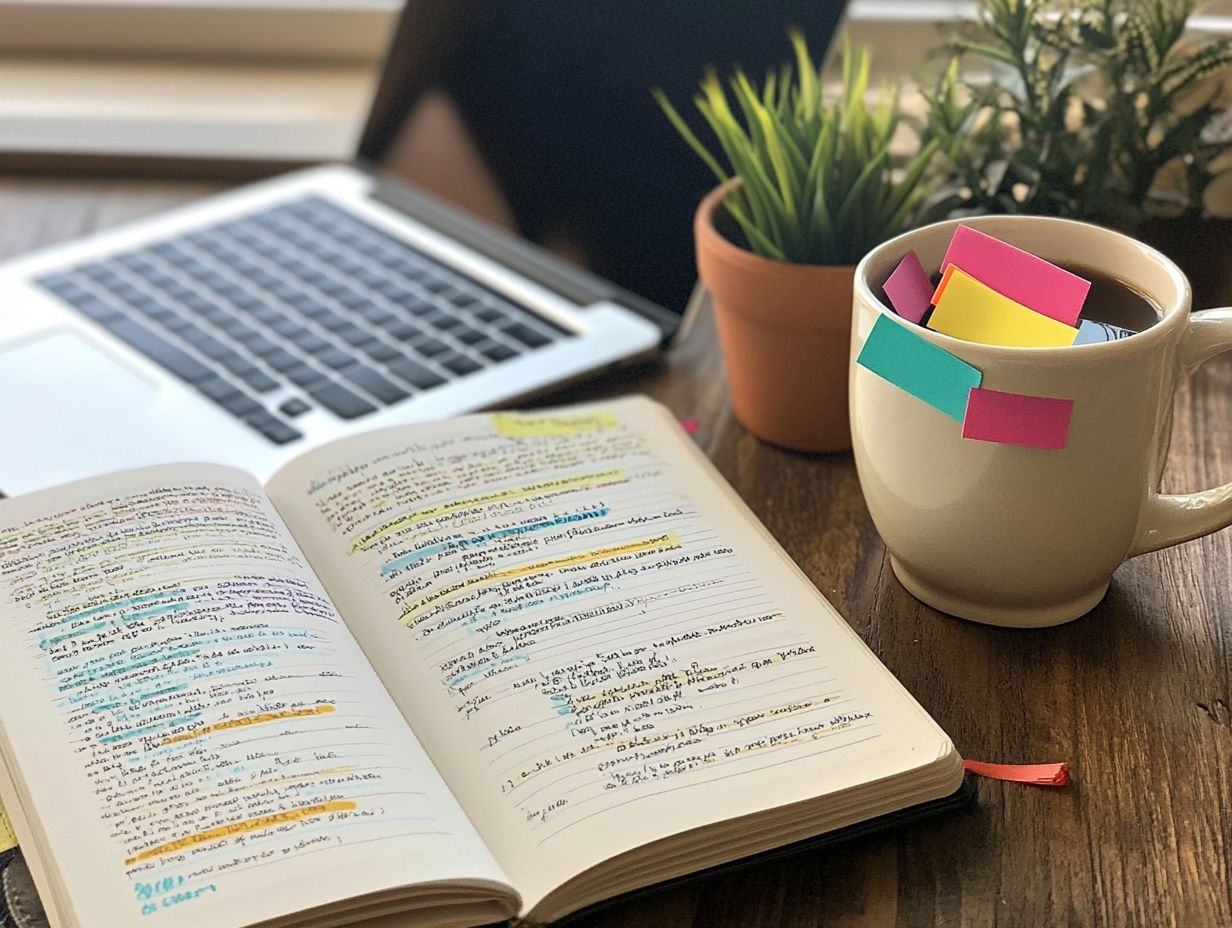5 Essential Grammar Tips for Language Learners
Mastering grammar is an essential milestone on your journey to proficiency in any language. Whether you re just starting out or seeking to refine your existing skills, a solid grasp of the fundamentals can dramatically elevate your communication abilities.
Get ready! Here are five essential tips that will transform your grammar skills, guiding you through the intricacies of grammar, from identifying various parts of speech to using online resources effectively.
Navigating common pitfalls, employing effective practice techniques, and paying attention to often-overlooked rules can truly transform your language learning experience. Immerse yourself in these insights to enhance your grammar skills and unlock new levels of mastery!
Contents
- Key Takeaways:
- 1. Understand the Basics of Grammar
- 2. Practice Regularly
- 3. Pay Attention to Word Order
- 4. Learn the Different Parts of Speech
- 5. Use Online Resources and Tools
- Why Is Grammar Important in Language Learning?
- How Can One Improve Their Grammar Skills?
- What Are Some Helpful Tips for Remembering Grammar Rules?
- How Can One Practice Grammar in Real-Life Situations?
- What Are Some Common Grammar Rules That Are Often Overlooked?
- Frequently Asked Questions
- What are the 5 essential grammar tips for language learners?
- Why is practicing regularly important for improving grammar?
- How can learning basic grammar rules benefit language learners?
- In what ways can reading and listening to native speakers improve grammar skills?
- Why are grammar exercises important for language learners?
- How can feedback from a teacher or language partner aid grammar learning?
Key Takeaways:

- Understanding basic grammar concepts is crucial for language learners.
- Consistent practice is key to mastering grammar skills.
- Word order can significantly impact the meaning of a sentence.
1. Understand the Basics of Grammar
Understanding the basics of grammar is crucial for effective communication in English. It lays the groundwork for developing robust writing and speaking skills, allowing you to express your ideas clearly and accurately.
This entails adhering to fundamental rules such as verb conjugation (changing verbs to match the subject), word order, and the appropriate use of adjectives and adverbs.
Mastering grammar goes beyond merely memorizing rules; it involves recognizing the essential role sentences play in conveying meaning. For instance, conjunctions act as vital connectors, enabling you to articulate your thoughts cohesively.
To enhance your comprehension, consider adopting various learning methods, including interactive exercises and multimedia resources. Teachers guide you through practical examples, encouraging the use of resources like grammar workbooks and online tools, which foster a deeper understanding of language mechanics.
2. Practice Regularly
Regular practice is essential for mastering grammar. It enables you to reinforce your understanding of grammatical rules and elevate your writing skills through engaging activities and self-study techniques.
To further enrich your learning experience, consider employing a variety of methods. For example, using mentor sentences (well-structured examples) provides a solid model for you to analyze and emulate, helping you internalize crucial grammatical structures.
Role-playing activities not only spark creativity but also allow you to practice language in realistic contexts, making grammar feel more relevant and memorable.
Informal assessments can offer valuable insights into areas needing improvement, fostering continuous dialogue between you and your educators. Constructive feedback during these practices is vital, as it prompts you to reflect on your progress and keeps you motivated on your language journey.
3. Pay Attention to Word Order
Paying attention to word order is essential for constructing sentences in English. Misplacing words can alter meanings and disrupt communication, especially when dealing with past tense verbs and present continuous tenses.
Understanding the importance of word order goes beyond grammar; it s a crucial factor that shapes comprehension and clarity. For instance, think about the difference between “The dog chased the cat” and “The cat chased the dog.” The switch in subject and object completely changes the situation being described.
To deepen your understanding, engaging in interactive activities like sentence rearrangement games or collaborative storytelling can be incredibly effective. Practicing with examples such as turning simple sentences into questions or negatives allows you to see firsthand how precise word placement can enhance communication.
Start using these tips today, and watch your skills soar!
4. Learn the Different Parts of Speech

Understanding the parts of speech is crucial for mastering grammar. It helps you create meaningful sentences and grasp the roles of nouns, verbs, adjectives, adverbs, and conjunctions.
Grasping these concepts enhances your writing and speaking skills. This allows you to express your ideas and emotions more clearly.
For example, recognizing a noun as a person, place, or thing helps you pinpoint crucial elements in your narratives. Using visual aids, such as vibrant charts or interactive digital tools, can bring these parts of speech to life.
Including teaching strategies like collaborative exercises where you group words according to their part of speech fosters engagement and deepens your understanding of grammar.
5. Use Online Resources and Tools
Using online resources and tools can supercharge your grammar instruction! They offer students interactive platforms to hone their English skills while accessing a treasure trove of educational materials tailored for effective language learning.
These platforms often come with engaging features like quizzes, games, and forums. Learners can share challenges and clear up confusion surrounding grammar rules.
Many online applications provide valuable feedback on student performance. This enables you to adapt your teaching strategies according to each individual s progress.
By incorporating these innovative resources into your lesson plans, you can create a more dynamic learning environment. This inspires students to actively engage in their language development.
Use online tools to clear up common grammar myths. This not only deepens understanding but also gives learners the confidence they need to communicate with clarity and precision.
Why Is Grammar Important in Language Learning?
Grammar serves as a cornerstone of your language learning journey. It significantly enhances your ability to communicate effectively.
It deepens your understanding of the English language, enabling you to express your thoughts clearly and connect ideas with confidence through targeted learning strategies and contextual experiences.
Once you grasp grammatical rules, you can articulate your ideas with precision and nuance, whether in writing or conversation. This mastery minimizes misunderstandings and amplifies the effectiveness of your interactions.
A solid grounding in grammar boosts your academic performance. It also equips you with skills that lead to success in essays and presentations.
Over time, these capabilities cultivate critical thinking and analytical skills. They provide you with lasting advantages that extend into both your professional and personal life, where effective expression is key to achieving your goals.
What Are the Most Common Grammar Mistakes Made by Language Learners?
As a language learner, you may find yourself grappling with common grammar mistakes. Examples include the misuse of double negatives, confusion between homophones, and errors in verb conjugation especially with past tense forms that can muddle your communication.
These challenges often arise from various factors, including the influence of your native language or insufficient exposure to correct usage in context.
For example, you might say, “I don’t need no help,” which not only perplexes the listener but also introduces ambiguity.
To tackle these issues, engage in regular writing exercises and join group discussions. Seeking feedback from peers and educators can offer valuable insights, helping you identify mistakes and sharpen your grammar skills over time.
How Can One Improve Their Grammar Skills?

Improving your grammar skills requires a multifaceted approach that blends consistent practice with various learning methods, constructive feedback, and educational resources tailored to your needs.
To enhance your grammar skills, consider incorporating mentor sentences from great literature and engaging in self-study through online resources or grammar workbooks. Participating in interactive activities, such as writing workshops or grammar games, can make learning enjoyable and effective!
Setting personal goals focusing on specific areas for improvement is essential. By establishing benchmarks and celebrating small achievements, you not only stay motivated but also build confidence in your ability to communicate clearly.
What Are Some Helpful Tips for Remembering Grammar Rules?
Enhancing your grasp of grammar rules can be a seamless journey when you use effective strategies like visual aids, engaging activities, and contextual learning. These methods solidify concepts and make learning enjoyable!
One effective approach is to create mnemonic devices that encapsulate grammatical rules into catchy phrases. For instance, to remember the order of adjectives, you might use the memorable phrase ‘OSASCOMP,’ which stands for:
- Opinion
- Size
- Age
- Shape
- Color
- Origin
- Material
- Purpose
Incorporating picture books into your learning can enhance comprehension. By analyzing sentences within cherished narratives, you can see grammar in action, illustrating proper usage within context.
Role-playing exercises also create a dynamic environment for exploring different grammatical structures. Whether you re using correct verb tenses or mastering subject-verb agreement, these practical applications foster a deeper understanding and bring grammar to life!
How Can One Practice Grammar in Real-Life Situations?
Practicing grammar in real-life situations allows you to apply your knowledge and enhance your communication skills, benefiting from ESL teaching strategies methods used to teach English to speakers of other languages that foster engagement and contextual learning.
Engaging in casual conversations with peers helps refine your sentence structure and vocabulary while providing immediate feedback. Writing emails to classmates cultivates your written communication skills and allows for correcting any grammatical missteps.
Participating in group discussions creates a collaborative atmosphere where you can absorb diverse perspectives and actively use grammar in a dynamic context.
By embracing constructive feedback from instructors and classmates, you can identify areas for improvement, gradually boosting your confidence and proficiency in language usage over time.
What Are Some Common Grammar Rules That Are Often Overlooked?
Many common grammar rules are frequently overlooked by language learners, including:
- The proper use of conjunctions
- The application of verb tenses
- The importance of consistency in writing
Understanding these rules is vital not only for academic success but also for effective interpersonal communication. Many students struggle with these aspects, leading to misunderstandings and unclear messages.
To tackle this challenge, educators can implement strategies such as interactive workshops, peer review sessions, and targeted exercises emphasizing real-world applications.
Incorporating these methods helps learners grasp the practical implications of grammar, boosting their confidence and fluency in expressing thoughts.
Frequently Asked Questions

What are the 5 essential grammar tips for language learners?
The 5 essential grammar tips for language learners are: 1) Practice regularly, 2) Learn basic grammar rules, 3) Read and listen to native speakers, 4) Use grammar exercises, and 5) Get feedback from a teacher or language partner. Additionally, consider these quick tips for language learners on a budget to enhance your learning experience.
Why is practicing regularly important for improving grammar?
Practicing regularly reinforces grammar rules and makes them feel natural. It also helps spot mistakes, leading to better language skills.
How can learning basic grammar rules benefit language learners?
Basic grammar rules lay the groundwork for understanding a language’s structure. They make it easier to tackle advanced grammar concepts later on.
In what ways can reading and listening to native speakers improve grammar skills?
Reading and listening to native speakers show correct grammar in real situations. This exposure helps develop a natural feel for the language and boosts overall comprehension.
Why are grammar exercises important for language learners?
Grammar exercises allow learners to apply rules in a controlled environment. They help pinpoint weaknesses and provide focused practice for improvement.
How can feedback from a teacher or language partner aid grammar learning?
Feedback from a teacher or language partner offers personalized help and guidance. It encourages dialogue, allowing clarification of grammar questions.






